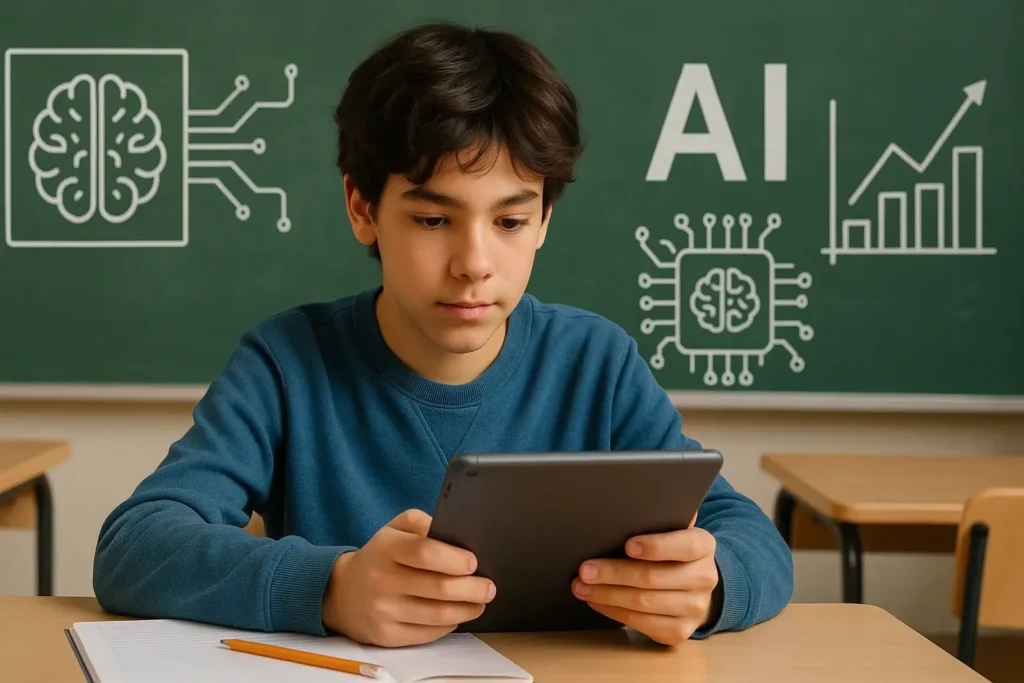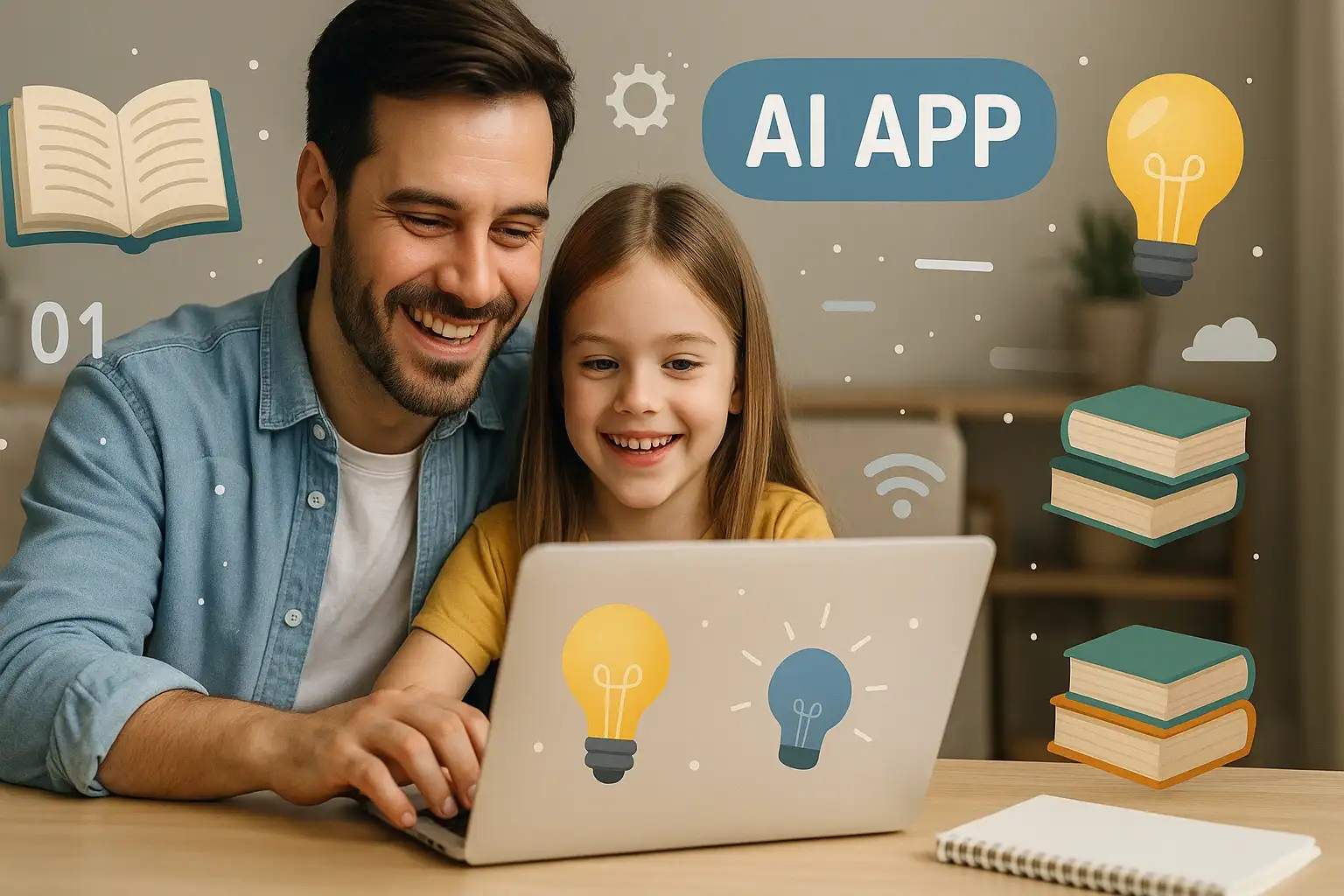What Parents Should Know About AI in Education is more than just a trendy topic—it’s a real and growing part of your child’s school life. Whether you’re familiar with technology or not, this article will walk you through everything you need to know in simple, clear language.
Artificial Intelligence (AI) is already helping teachers in the classroom and changing the way students learn. But as a parent, it’s normal to feel unsure. Is it safe? Is it good for kids? Will it replace teachers?
Let’s explore these questions together and discover how AI can actually support your child’s education—without the confusion or scary headlines.
What Is AI, Really?
You’ve probably heard the term “AI” a lot. But what is it, really?
AI, or Artificial Intelligence, is a computer’s ability to “think” and make decisions, just like a human. It doesn’t mean robots taking over the classroom. Instead, AI helps with things like:
- Giving students personalized feedback
- Suggesting study materials based on what a student needs
- Translating languages instantly
- Correcting grammar and spelling
- Organizing schedules and reminders
In short, AI is like a digital assistant for learning. It doesn’t replace the teacher—it supports the teacher and the student.
Why Schools Are Using AI
AI in education is growing fast. But why?
Because it helps teachers handle everyday tasks so they can spend more time with students. Here are a few reasons schools are turning to AI:
- Personalized Learning: AI can adjust lessons based on how a child learns best.
- Faster Feedback: Students get instant suggestions or corrections.
- Inclusivity: Tools like voice-to-text help students with disabilities or learning difficulties.
- Language Support: AI can translate content for students who speak other languages.
This makes classrooms more flexible and welcoming.
How AI Supports Your Child’s Learning
Imagine your child is struggling with math. The teacher is doing their best, but can’t give one-on-one time all day. An AI app can notice where your child is stuck and offer extra practice. It learns from your child’s progress and gives tips in real time.
Or maybe your child has a hearing problem. AI can generate subtitles during video lessons so they don’t miss a thing.
Here are some practical examples of AI in schools:
- Khan Academy uses AI to guide learning at a student’s pace (https://www.khanacademy.org).
- Duolingo uses AI to help students learn new languages with fun and games (https://www.duolingo.com).
- Grammarly helps students improve writing by correcting grammar and suggesting better words (https://www.grammarly.com).

What Parents Often Worry About
It’s natural to have concerns. Here are some of the most common ones—and what you should know:
1. Is AI Safe for My Child?
Yes, as long as the tools are approved by the school and follow privacy laws. Many countries (including Brazil, Europe, and the U.S.) have strict data protection rules for children.
Still, ask the school how they handle student data. You have the right to know.
2. Will My Child Become Too Dependent on AI?
AI should be a helper, not a crutch. The goal is to make learning easier, not replace effort. That’s why schools use AI tools in combination with teacher guidance.
3. Will AI Replace Teachers?
Not at all. AI can correct papers or provide quizzes—but it can’t give hugs, encourage creativity, or truly understand a child’s emotions. Teachers will always be the heart of the classroom.
How You Can Be Involved
You don’t need to be a tech expert to support your child. Here’s how you can stay involved:
- Talk to teachers about how AI is used at school.
- Ask your child what tools they use and how they feel about them.
- Learn together—explore safe and fun apps at home.
- Protect privacy—help your child understand why they shouldn’t share personal information online.
When parents and schools work together, AI becomes a powerful tool—not a scary one.
Pros and Cons of AI in Education
Pros
- Personalized learning paths
- Fast and helpful feedback
- Extra support for kids with different needs
- Multilingual tools
- Saves teachers’ time
Cons
- Not all tools are perfect
- Risk of too much screen time
- Need for strong privacy rules
- Requires good internet access
Understanding these helps you ask the right questions at your child’s school.
👉 Understand the pros and cons of AI in education for students. Learn how to balance technology with human interaction in schools.
How to Choose Safe AI Tools for Your Child
When exploring apps or platforms, keep these tips in mind:
- Check for age-appropriate content
- Look for strong privacy policies
- Use apps recommended by teachers
- Avoid tools that use ads or ask for too much data
- Read reviews from other parents
If something feels “off,” trust your instinct. You know your child best.
Key Points About What Parents Should Know About AI in Education
- AI helps personalize learning and support students.
- Teachers are still the most important part of education.
- AI tools should be used safely and ethically.
- Parents play a key role in monitoring and guiding their children’s use of AI.
- Talk to your child and their teachers about how AI is being used.
Conclusion
Artificial Intelligence is becoming part of our children’s everyday school life. And while it may sound complicated, it doesn’t have to be scary. When used the right way, AI supports learning, helps teachers, and opens up new opportunities.
As a parent, your involvement makes all the difference. Ask questions, stay curious, and walk side-by-side with your child in this journey of modern learning.
What do you think about AI in your child’s education? Share your thoughts in the comments—we’d love to hear from you!

